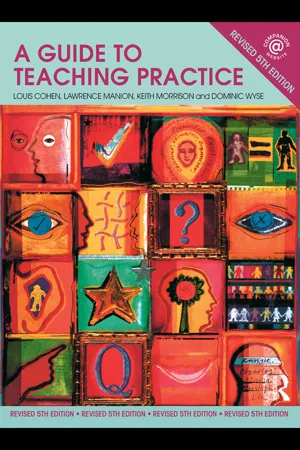
A Guide to Teaching Practice
5th Edition
- 560 pages
- English
- ePUB (mobile friendly)
- Available on iOS & Android
About this book
A Guide to Teaching Practice is the major standard text for all students on initial teacher training courses in the UK.
Authoritative yet accessible, it covers the important basic skills and issues that students need to consider during their practice, such as planning, classroom organization, behaviour management and assessment. The book's focus on the quality of teaching and learning and consideration of the latest regulations and guidelines ensures that it fits comfortably within TTA and OfSTED frameworks.
In addition, comprehensively revised and fully updated, this fifth edition features brand new chapters on the foundation stage, legal issues, learning and teaching and using ICT in the classroom, as well as new material on numeracy, literacy, children's rights, progress files and gifted and talented children.
This book is the most respected and widely used textbook for initial teacher training courses and will be an essential resource for any student teacher.
Tools to learn more effectively

Saving Books

Keyword Search

Annotating Text

Listen to it instead
Information
PART I
SOME PERSPECTIVES ON TEACHING AND LEARNING
1
A Background to Current Developments in Education
INTRODUCTION
Table of contents
- A Guide to Teaching Practice – Companion Website
- Contents
- Boxes
- Foreword to the Revised Fifth Edition
- Acknowledgements
- PART I SOME PERSPECTIVES ON TEACHING AND LEARNING
- PART II PREPARATION AND PLANNING
- PART III PRACTISING TEACHING
- PART IV ASSESSMENT, RECORD KEEPING AND REPORT WRITING
- Notes and References
- Bibliography
- Index
Frequently asked questions
- Essential is ideal for learners and professionals who enjoy exploring a wide range of subjects. Access the Essential Library with 800,000+ trusted titles and best-sellers across business, personal growth, and the humanities. Includes unlimited reading time and Standard Read Aloud voice.
- Complete: Perfect for advanced learners and researchers needing full, unrestricted access. Unlock 1.4M+ books across hundreds of subjects, including academic and specialized titles. The Complete Plan also includes advanced features like Premium Read Aloud and Research Assistant.
Please note we cannot support devices running on iOS 13 and Android 7 or earlier. Learn more about using the app